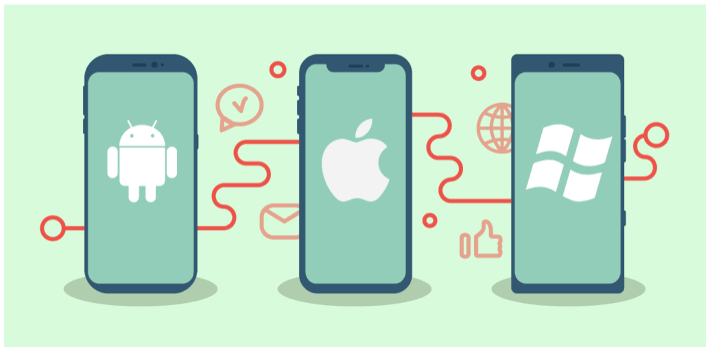If you're looking for a mobile app development solution, you may have heard about the benefits of native mobile apps. They are often faster, more flexible, and have a higher conversion rate than their web counterparts.
Native apps are also not vulnerable to bugs and scaling problems. Here are 5 of the major advantages of native mobile app development.
Listed below are some of the main reasons why native apps are better than their web counterparts.
Table of Contents
Benefits of Native Mobile App Development

Native apps have higher conversion rates
If you're unsure about whether or not you should use a mobile app, you're not alone. Studies have shown that a native app has a higher conversion rate than mobile web or a PWA. One example of a conversion rate increase is PME Legend, which saw a 38% conversion rate lift after converting from a mobile website to a PWA. Additionally, a native app increased their conversion rate by 160%.
Despite the difference in user behavior, there are a number of reasons to switch over to a mobile app. In addition to better user engagement and brand loyalty, mobile apps offer many more interaction possibilities than a plain website. Studies have shown that smartphone users view 4.2x more products in a single session than desktop users. The reason is clear: mobile apps load straight onto the user's device, requiring only a click to access information.
Despite the differences in functionality, the overall conversion rate for a mobile app is still higher than those of a desktop app. While the overall rate is a bit higher, that still represents a very low number. However, if you're a mobile marketer and you're planning on creating an app for a smartphone, it's best to invest in a native app. This way, you can create a high-quality app that converts well.
To increase your app's conversion rate, you should simplify subscriptions and payment methods. Complicated registration procedures turn off many users, and by reducing the amount of information that users need to enter, you can increase your app's overall conversion rate. This is why it's essential to target the right audiences and measure their behavior. If you do this, you'll be well on your way to increasing revenue. In the end, it will all be worth it.
While mobile web and mobile apps look similar, there are key differences between the two. Despite their similarities, mobile apps convert better than websites. In fact, the former converts by 157% more often than the latter. It is possible to make one website look good on any platform, but that doesn't apply to all clients. Instead, you'll be better off implementing a mobile app to reach your audience. But how can you know which one will convert better than the other?
They are easier to scale
The primary difference between native and cross-platform apps is scalability. Cross-platform apps are much easier to scale. Native projects are separate and compatible with only one platform. Native apps can take advantage of the latest features in a platform without rewriting the code. Scalability is also easier for native projects. There are some companies that use both native and cross-platform solutions in their development, including Facebook, AirBnB, and Uber.
AWS handles scaling issues for apps. The auto-scaling feature of many cloud services allows apps to be scaled dynamically based on user demand. By defining the parameters required for the app, the auto-scale feature can adjust to meet user demands. In the end, AWS takes care of the rest. However, it's still important to have a good reason to scale your mobile app. Here are some questions to ask yourself about the capacity of your app.
They are faster to configure
There are several advantages of using native mobile app development solutions. They are faster and configure easier, and they offer advanced security measures to protect sensitive data. Native mobile apps are also compatible with only one platform, which makes them ideal for future app expansion. Besides, native apps are easier to maintain and configure, making them the preferred choice for businesses and organizations. Read on to find out more about these advantages! Listed below are a few of them.
React Native: When it comes to configuration and replatforming, React Native is much faster. The developers will be able to keep building and updating their apps. The testing teams will find it easier to set up testing scenarios, which saves time and money. Native mobile app development is faster to configure, which can be an advantage if you're a beginner. However, the process of integrating newly-built apps into an existing IT infrastructure is time-consuming, so if you want to save on costs, you should use native development instead.
They are not vulnerable to bugs
A recent study conducted by Check Point found that a small number of popular mobile applications are susceptible to known bugs. The study found old code and three signatures that were indicative of RCE vulnerabilities. The researchers also found that only 13% of apps had all of these three features. It was estimated that this means that about 80% of apps are safe to use. However, the report only considers a small number of apps, and they don't cover every type of bug that could exist in a mobile application.
Another major advantage of native mobile apps is their speed. Compared to hybrid apps, native mobile apps are optimized for the platform they are designed for. Native mobile apps use the native programming language and APIs of the platform, which means that they are faster and less prone to bugs. Furthermore, they use the device's processing power to give the user an optimal experience. The speed of native mobile apps makes them easier to test and debug, thereby lowering the development time.
Some vulnerabilities are specific to Android. Some Android apps are purely native to the device, while others act as front ends for cloud services. However, native mobile apps are not immune to bugs, which can affect performance and security in different ways. One major example is the Heartbleed vulnerability in Android. While the Android platform is not directly affected, many Android apps leverage vulnerable OpenSSL libraries. Because the vulnerability involves server-side code, malicious servers can use it to attack vulnerable clients and steal sensitive information. By using good coding practices, developers can reduce their apps' risk profile.
They are More Interactive And Intuitive
Native mobile apps run much smoother regarding user input and output. These types of apps inherit their devices’ OS interfaces, making them look and feel like an integrated part of the device.
The most advantageous benefit to native mobile apps is the superior user experience. Native apps are created specifically for an operating system. They stick to the guidelines that ultimately enhance and align the user experience with the specific operating system.
As a result, the flow of the app is more natural as they have specific UI standards for each platform. This allows the user to learn the app, such as deleting an element quickly. Adhering to specific guidelines eliminates the learning curve and allows users to interact with apps using actions and gestures they’re familiar with already.





One Comment
This was a very informative blog and I really enjoyed reading it. But I also have a few points regarding it to discuss with you.
Native IOS App Development is the best way to develop an IOS app that will provide the best performance for your users. Native iOS apps are incredibly user-friendly and efficient and they are also more likely to be popular with customers
Here are the advantages of developing native iOS apps:-
1. More Secure
2. More Interactive And Intuitive
3. Better Scalability
To check the full list of tips, visit alakmalak.com